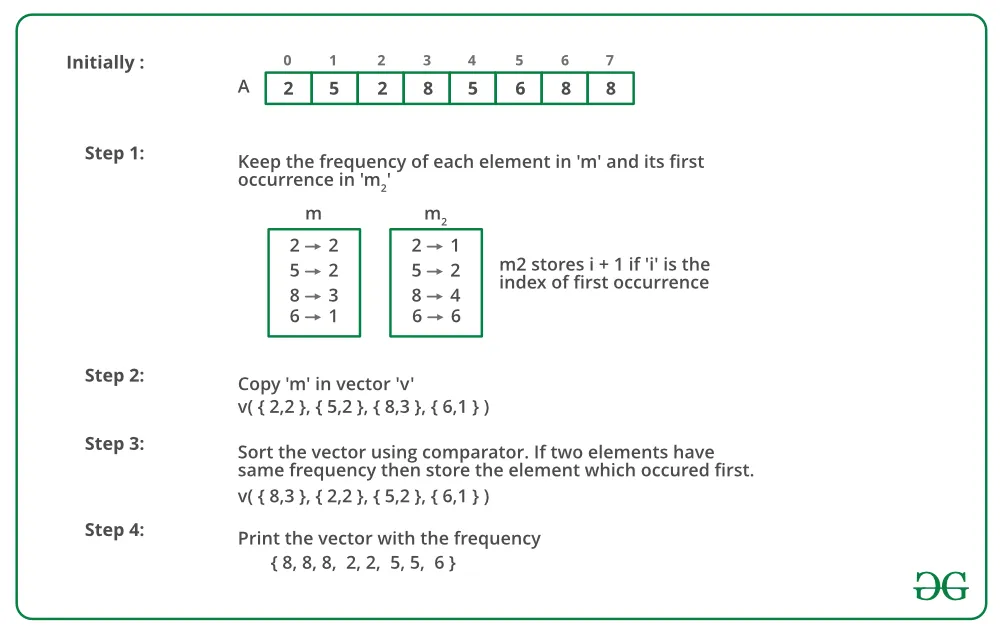Given an array **arr[] of N **strings. Let X and Y be two strings, X and Y are said to bevalid pair if the rearrangement of the resultant string from the concatenation of X with X (i.e., X+X) gives Y. The task is to count the number of such valid pairs.
Examples:
Input:_ N = 4, arr[] = {“hacker”, ”ackerhackerh”, ”int”, ”iittnn”, ”long”}_
Output:_ 2 _
Explanation:
Pair {“hacker”, ”ackerhackerh”} “hacker” When concatenated with “hacker” gives ”ackerhackerh” after rearrangement.
_Pair {“int”, ”iittnn”} “int” When concatenated with “int” gives ”iittnn” after rearrangement. _
Input:_ N = 3, arr[] = {“easy”, ”yeasseay“, “medium“} _
Output:1
Explanation:
Pair {“easy”, ”yeasseay“} “easy” When concatenated with “easy” gives ”yeasseay“ after rearrangement.
Recommended: Please try your approach on {IDE} first, before moving on to the solution.
Naive Approach: The idea is to generate all possible pairs and check if any pairs form a valid pair as per the given condition or not. If yes then count this pair and check for the next pair. Print the value of count after the above steps.
Time Complexity:_ O(N2)_
Auxiliary Space:_ O(1)_
Efficient Approach: The idea is to store the sorted string in Hashmap along with its count and iterate through each string of the array concatenate it with itself and find its count in Hashmap add it to the count of pairs. Below are the steps:
- Create a hashmap.
- Sort the given strings in the array and store its count in hashmap.
- Again iterate through all strings and concatenate each string with itself sort the string and find its count in Hashmap.
- Update the final count in the above step and print the final count after all the above steps.
Below is the implementation of the above approach:
- Java
- Python3
// Java program for the above approach
**import** java.util.*;
**public** **class** Main {
// Function that count total number
// of valid pairs
**public** **static** **int**
countPairs(String arr[], **int** N)
{
// Create hashmap to store the
// frequency of each string
// in sorted form
HashMap<String, Integer> map
= **new** HashMap<>();
// Initialise the count of pairs
**int** count = 0``;
**for** (``**int** i = 0``; i < N; i++) {
String s = sort(arr[i]);
// Store each string in sorted
// form along with it's count
map.put(s, map.getOrDefault(s, 0``) + 1``);
}
// Iterate through each string
// in the array
**for** (``**int** i = 0``; i < N; i++) {
// Concatenate each string with itself
String s = sort(arr[i] + arr[i]);
// Find its count in the hashmap
count += map.getOrDefault(s, 0``);
}
// Return answer
**return** count;
}
// Function to implement sorting on
// strings
**public** **static** String sort(String s)
{
// Convert string to char array
**char** ch[] = s.toCharArray();
// Sort the array
Arrays.sort(ch);
StringBuffer sb = **new** StringBuffer();
**for** (``**char** c : ch)
sb.append(c);
// Return string
**return** sb.toString();
}
// Driver Code
**public** **static** **void** main(String args[])
{
**int** N = 3``;
// Given array of strings
String arr[] = { "easy"``, "yeasseay"``,
"medium" };
// Function Call
System.out.println(countPairs(arr, N));
}
}
Output:
1
Time Complexity:_ O(N)_
Auxiliary Space:_ O(N)_
Attention reader! Don’t stop learning now. Get hold of all the important DSA concepts with the DSA Self Paced Course at a student-friendly price and become industry ready.
#hash #sorting #strings
